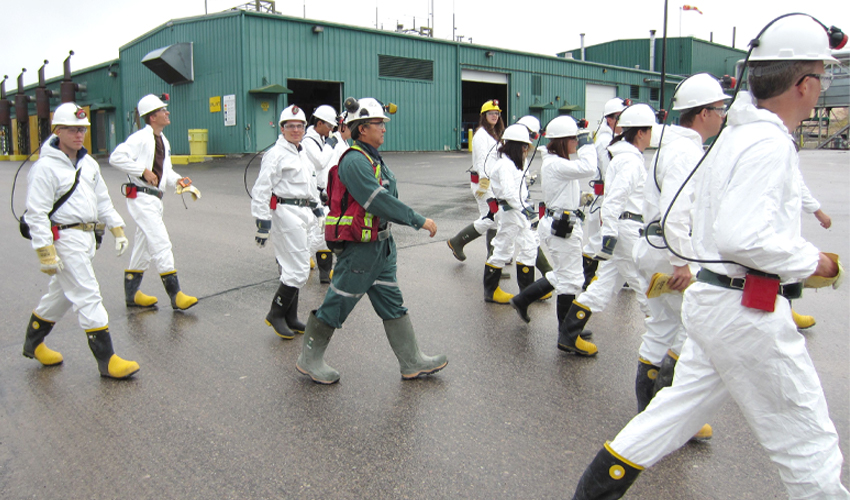Public policy and nuclear science cross disciplinary divide

Social science reacts with nuclear science in a course taught by two Mount Royal University professors.
As the ten-year-old offering from Brett McCollum, PhD, professor in chemistry, and Duane Bratt, PhD, professor in policy studies, continues to evolve, the benefits the disciplines can bring to each other are becoming more and more pronounced.
“Public policy decisions should be based on scientific knowledge,” McCollum says. “Conversely, science cannot be used alone to make decisions. Public policy and politics are always part of any conversation of nuclear energy, as we've seen in the aftermath of the accident at the Fukushima Daiichi nuclear power site, for example.”
CHEM 3802: The Science and Politics of Nuclear Energy begins by exploring topics related to nuclear and radiochemistry: radiation, nuclear reactions, decay kinetics, detection equipment, worker safety, reactor design versus weapons, and the science involved in nuclear disasters.
The course then turns to discussions and debates around the history, politics and policy of nuclear energy. The last three weeks of class focus on medical isotopes and other applications of nuclear technology, interweaving science and policy perspectives.
An international invitation
The two professors were invited to Paris in December, presenting to the Nuclear Energy Agency (NEA) during a two-day meeting titled “The nuclear and social sciences nexus: challenges and opportunities for speaking across the disciplinary divide.” Some 60 experts from around the world discussed science and public policy in nuclear energy and proposed strategies for interdisciplinary teaching and learning. Bratt and McCollum’s presentation centred on their experiences and observations teaching the course.
“Technology is not neutral. Technology always has a purpose and that’s where the social sciences can step in,” Bratt says, adding that the meeting discussed, among other topics, siting of nuclear projects.
“I don’t know how you do that without looking at it through a societal lens. You don’t just find a location that meets the technological standards of building a reactor or a waste disposal site; you have to look at public support and the economics behind it.”
In their presentation, McCollum and Bratt identified the challenges they face teaching the course, including the lack of a nuclear industry in Alberta, and student fears of taking a course that will challenge them to think in different ways. They also presented the benefits they have documented, such as creating well-rounded citizens who can better engage in conversations that cross-scientific and public policy domains.
Bratt said participating in a panel on pedagogy and teaching drove home how unique the MRU course is.
“There’s nothing out there like what we’re doing here.”
Confronting one’s own thinking
Since the course began, it has “challenged hundreds of senior MRU students to re-examine their beliefs around nuclear energy with the objective of using evidence ― rather than opinion ― to argue their position,” McCollum says. “We don't expect students to become pro- or anti-nuclear, but we do expect them to back up their position with evidence.”
It has also become clear how afraid many non-science students are of taking a course that involves math, and how science students are equally afraid of writing a 20-page term paper.
“We've added supports into the course structure to enable learners from across the University to participate and succeed in the course. Over the years, we've had top students in the course come from all of MRU's different faculties.”
Alumna Vinita Kumar had experience taking typical chemistry classes but she wanted to try out a course taught with a multidisciplinary approach.
“I picked this course because I wanted to know more about nuclear chemistry. I had heard a lot about nuclear energy and issues with ensuring the safety of nuclear reactors and I wanted to understand how or why nuclear energy production could be a problem.”
Kumar, who graduated in 2018 with a Bachelor of Science ― Health Science and a minor in Chemistry and now works for Alberta Health Services and Alberta’s Tomorrow Project, says she saw the value in the course and its combination of science and social science.
“I think it's important to realize that no one topic is purely science or purely social science; the two will always be related. For example, it is important to recognize that production of nuclear energy uses scientific principles, but that it also has political aspects to ensure the reactor is safe, efficient, and cost effective. Therefore, I think scientists and social scientists should fill in each other's gaps in knowledge so that both have a complete understanding.”
The course has resulted in unique opportunities both for professors and students, including a visit to a uranium mine in northern Saskatchewan. Bratt was also invited by the Japanese government to tour the Fukushima-Daiichi prefecture, and McCollum has been invited to visit several nuclear facilities. Currently, Bratt is involved in public consultations for selection of a permanent nuclear waste site in Canada, and McCollum has been an advocate for increased access to medical isotopes here in Calgary.
A real-world convergence of the themes that the course presents was the Dec. 2 signing of a Memorandum of Understanding between Ontario, New Brunswick, and Saskatchewan. The three provinces agreed to work together to explore the construction of Small Nuclear Reactors (SMRs) in Canada. The agreement involves politicians, public consultations, scientists and business.
“It will have scientific benefits and economic benefits,” McCollum says. “Furthermore, nuclear energy is a zero-carbon energy source and is an important part of any conversation of technologies to mitigate climate change.”
“Mount Royal is a university where faculty are encouraged to move outside their disciplinary silos and exchange ideas,” he adds. “MRU is the right type of university for cross-faculty courses like The Science and Politics of Nuclear Energy to emerge.”

